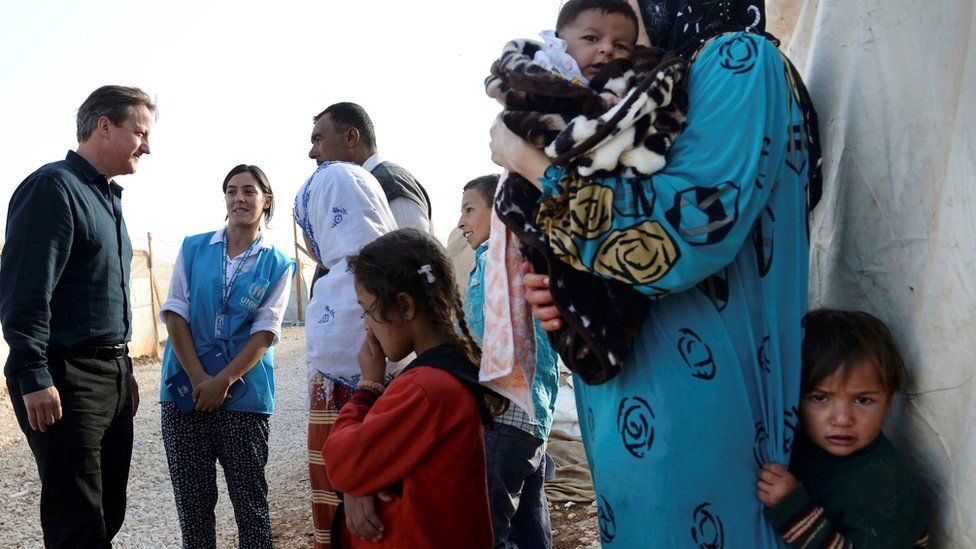Migrant crisis: UK response criticised by senior former judges
- Published

Leading former judges and lawyers have criticised the government's "slow and narrow" response to the migrant crisis.
Lord Phillips, former UK Supreme Court head, and Lord Macdonald, ex-director of public prosecutions, are among 300 to sign an open letter on the issue.
They say the offer to accept 20,000 refugees over five years is not enough. One retired judge said the UK could cope with taking in 75,000 a year.
The government said it had been at the forefront of the global response.
In addition to offering to accept 20,000 refugees from camps bordering war-torn Syria, it has provided £1bn in aid to Syria, with an extra £100m given to charities to help thousands of people displaced by the conflict.
'Shared responsibility'
Among others to put their name to the open letter to the press is former president of the European Court of Human Rights, Sir Nicolas Bratza.
Catriona Jarvis, a retired judge, says the government's response to the refugee crisis had been "too low, too slow and too narrow"
Signatory Catriona Jarvis, a retired judge, told BBC Radio 4's Today Programme the government's response to the refugee crisis had been "too low, too slow and too narrow".
She said Britain could accept many more refugees.
"Around the Balkan crisis we were receiving around 75,000 a year. It was within our capability. We managed it well," she said.
"We are the sixth or seventh richest country in the world, it is not beyond our capabilities to make the necessary changes to receive our share.
"International protection, it is a shared duty, a shared responsibility."
'Humanitarian visas'
BBC legal affairs correspondent Clive Coleman says it is "highly unusual" for former judges to publicly criticise government policy in such a way.
He said: "Today's statement is weighty and blunt. Blunt in calling the government's response to the refugee crisis 'deeply inadequate' and the offer of 20,000 resettlement places for Syrian refugees over five years 'too low, too slow and too narrow'.
"And weighty because of the signatories. Four former Law Lords, five retired Court of Appeal judges, a former president of the European Court of Human Rights, an ex-director of public prosecutions and 100 QCs who regularly represent the government."
Syrian refugees in the UK
20,000
more refugees will be resettled in the UK by 2020
4,980
Syrian asylum seekers have been allowed to stay since 2011
-
25,771 people applied for asylum in the UK in the year to end June 2015
-
2,204 were from Syria
-
87% of Syrian requests for asylum were granted
-
145 Syrian asylum seekers have been removed from the UK since 2011
The lawyers and judges are calling for the establishment of safe, legal routes into the EU.
One way of doing this would be to create a system of "humanitarian visas" so that refugees did not have to undertake dangerous journeys to reach Europe.
They claimed that people with a moral right to protection were being driven into the hands of people smugglers.
Pushpinder Saini QC, who regularly advises and represents the government, said: "The letter reflects profound concern in the legal profession... that the government lacks a coherent, just or humane response to the refugee crisis.
"As a nation which once had the foremost reputation as a safe haven for refugees, we have lost our way."
Sir Stephen Sedley, former Lord Justice of the Court of Appeal, said: "As a stable and prosperous country, we can do better than this."
'Suspend Dublin system'
The letter also calls for the suspension of the so-called Dublin system, which means asylum seekers must claim asylum in the first EU country in which they arrive.
The lawyers said "in certain member states, particularly at the EU's periphery, reception conditions have collapsed and determination procedures are rudimentary".
The first of the Syrian refugees arrived in the UK at the end of September.
Eventually the UK will have to take about 400 refugees a month in order to meet its 20,000 target by 2020.
The refugees will be brought to the UK from camps in countries neighbouring Syria, with those being resettled selected by the UN on the basis of need.
- Published23 September 2015
- Published22 September 2015
- Published14 September 2015
- Published14 September 2015